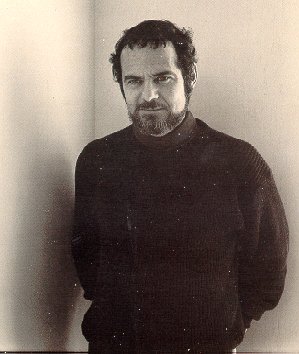

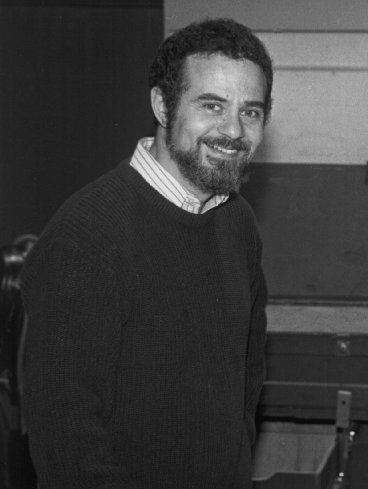 BD: Should it be at
least heard and then decided upon
by each concert generation?
BD: Should it be at
least heard and then decided upon
by each concert generation?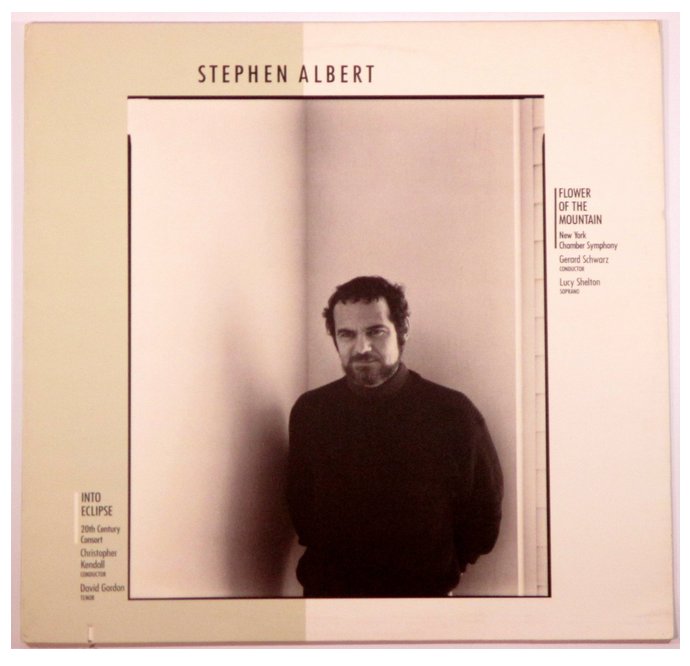 SA: The old
cliché used to be something like
five percent inspiration and ninety-five percent perspiration.
I’ve been around the block a few times, and I hope I can go around a
few more times, but we never know if fate is going to fall out of a
window and end our life right on the pavement unexpectedly. But
as I get older, I feel that there is no such thing as uninspired craft,
or uninspired perspiration. When a runner is running in a race,
they have trained for that race and they have really worked very
hard. So just for that race, for that moment, there are countless
hours of preparation. I feel the same way when I sit down to
write a piece of music — there
are all those hours of preparation. And I feel that the time that
you’re writing really is a time of great inspired perspiration.
Either you’ve got the heart for it or you don’t have the heart for it,
but you cannot separate the techniques that you bring to that
moment. When you’re a runner, the actual goal is getting to that
finish line first and beating your opponents, unlike the composer whose
goal is to finish in style. There is no such thing as beating
your opponents in art, but nevertheless, there is that sense that you
are working very hard with, perhaps, the first ideas that you are
given. They come from some mysterious place, and if they’re good
ideas it’s a good mysterious place; if they’re bad ideas it’s a bad
mysterious place. But there is this initial motivating thing
which, in a sense, you do get as a gift. What you do after that
has to be as inspired and as unselfconscious as a runner who is
running a race at the moment of that competition. I think that’s
what it really has to be. Even when orchestrating, my feeling is
that there has to be something, some energy force, that is of an
inspired nature, rather than just going through some sort of a drill.
SA: The old
cliché used to be something like
five percent inspiration and ninety-five percent perspiration.
I’ve been around the block a few times, and I hope I can go around a
few more times, but we never know if fate is going to fall out of a
window and end our life right on the pavement unexpectedly. But
as I get older, I feel that there is no such thing as uninspired craft,
or uninspired perspiration. When a runner is running in a race,
they have trained for that race and they have really worked very
hard. So just for that race, for that moment, there are countless
hours of preparation. I feel the same way when I sit down to
write a piece of music — there
are all those hours of preparation. And I feel that the time that
you’re writing really is a time of great inspired perspiration.
Either you’ve got the heart for it or you don’t have the heart for it,
but you cannot separate the techniques that you bring to that
moment. When you’re a runner, the actual goal is getting to that
finish line first and beating your opponents, unlike the composer whose
goal is to finish in style. There is no such thing as beating
your opponents in art, but nevertheless, there is that sense that you
are working very hard with, perhaps, the first ideas that you are
given. They come from some mysterious place, and if they’re good
ideas it’s a good mysterious place; if they’re bad ideas it’s a bad
mysterious place. But there is this initial motivating thing
which, in a sense, you do get as a gift. What you do after that
has to be as inspired and as unselfconscious as a runner who is
running a race at the moment of that competition. I think that’s
what it really has to be. Even when orchestrating, my feeling is
that there has to be something, some energy force, that is of an
inspired nature, rather than just going through some sort of a drill.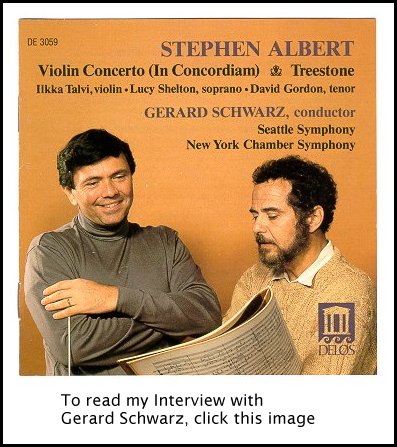 SA: Every one
of
them! If people don’t
like what they hear by a guy named Stephen Albert, it’s
going to be that guy’s — my — fault. The
performances were wonderful! There is
no scapegoat except for the composer, and deservedly so because
performers are such hard-working individuals in ways that even
composers and writers and painters are not. They’ve got to go
over a thing over and over again. Their life is filled with
drill, and that’s one of the things that made me want to be a composer
and the reason I didn’t want to be a pianist. In order to do my
work, I didn’t want to have
to go through that kind of drill. I have a high regard for
performers, and in almost all cases — if not all of them
— the performers who have worked with
me have been really
like saints and angels.
SA: Every one
of
them! If people don’t
like what they hear by a guy named Stephen Albert, it’s
going to be that guy’s — my — fault. The
performances were wonderful! There is
no scapegoat except for the composer, and deservedly so because
performers are such hard-working individuals in ways that even
composers and writers and painters are not. They’ve got to go
over a thing over and over again. Their life is filled with
drill, and that’s one of the things that made me want to be a composer
and the reason I didn’t want to be a pianist. In order to do my
work, I didn’t want to have
to go through that kind of drill. I have a high regard for
performers, and in almost all cases — if not all of them
— the performers who have worked with
me have been really
like saints and angels.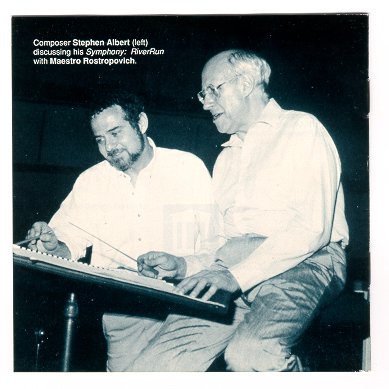 BD: So then each
composer really needs to have a
champion or two?
BD: So then each
composer really needs to have a
champion or two?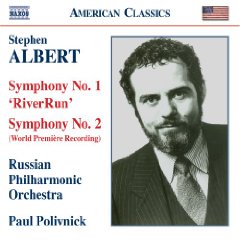 SA: The rest is
hard work. The one thing I will
say is that it’s not something other people force me to
do. It’s not something that I
have to punch a time clock for. To that degree,
it is like what other people do for a hobby. I can take my own
time in doing it, except those periods of work
where I have to earn my living teaching. For me, the lack of
routine is the only
way I could live and keep my mind together. Routines generally
have a very bad effect on me, and have had since I was a
youngster. It’s just the way I’m
made. However, I’m married to a very wonderful woman for
twenty-five years, and she’s
very much the opposite. She really does enjoy routines; she’s
just that way. T.S. Eliot is an artist, a wonderful poet that I
greatly admire and he was apparently a person of routines.
Wagner, whom I greatly
admire, was a person not of routines. So I don’t think it makes
us creative or not creative, to be either a person addicted to
routines or a person who rebels against routines. But my
particular thing is that composing allows me not to have a routine, and
that part of it is very good. But in the time of composing, most
of it really is very anxiety-provoking for me.
SA: The rest is
hard work. The one thing I will
say is that it’s not something other people force me to
do. It’s not something that I
have to punch a time clock for. To that degree,
it is like what other people do for a hobby. I can take my own
time in doing it, except those periods of work
where I have to earn my living teaching. For me, the lack of
routine is the only
way I could live and keep my mind together. Routines generally
have a very bad effect on me, and have had since I was a
youngster. It’s just the way I’m
made. However, I’m married to a very wonderful woman for
twenty-five years, and she’s
very much the opposite. She really does enjoy routines; she’s
just that way. T.S. Eliot is an artist, a wonderful poet that I
greatly admire and he was apparently a person of routines.
Wagner, whom I greatly
admire, was a person not of routines. So I don’t think it makes
us creative or not creative, to be either a person addicted to
routines or a person who rebels against routines. But my
particular thing is that composing allows me not to have a routine, and
that part of it is very good. But in the time of composing, most
of it really is very anxiety-provoking for me.
Stephen AlbertPulitzer Prize- and Grammy-winning composer Stephen Albert, whose tragic death in December of 1992 stunned the music world, was recognized in his lifetime for a body of work at once powerful, dramatic, colorful, and deeply emotive. Contemporary in sound, yet firmly rooted in traditional compositional techniques, Albert's music sought to establish links with fundamental human emotions and musical archetypes. He drew inspiration from the rich emotional palette of 19th-century music, and sought to discover, within the context of a personal 20th-century idiom, new connections with music of the past. Born
in New York City on 6 February 1941, Albert began his musical training
on the piano, French horn, and trumpet as a youngster. He first studied
composition at the age of 15 with Elie Siegmeister, and enrolled two
years later at the Eastman School of Music, where he studied with
Bernard Rogers. Following composition lessons in Stockholm with
Karl-Birger Blomdahl, Albert studied with Joseph Castaldo at the
Philadelphia Musical Academy (BM 1962); in 1963 he worked with George
Rochberg at the University of Pennsylvania. [See my Interview with Elie
Siegmeister.] Stephen Albert won the 1985 Pulitzer Prize in Music for his symphony RiverRun, and from 1985 to 1988 served as composer-in-residence with the Seattle Symphony. He received commissions from the Chicago, National, Pittsburgh, Baltimore, and Seattle symphonies, The Philadelphia Orchestra, the New York Philharmonic, the Chamber Music Society of Lincoln Center, and the Library of Congress. Among his other awards and honors were two MacDowell Colony fellowships, a Huntington Hartford Fellowship, two Guggenheim fellowships, two Rome Prizes, and grants from the Martha Baird Rockefeller Fund, the National Endowment for the Arts, the Ford Foundation, and the Alice M. Ditson Foundation. From 1988 to the time of his death, he was professor of composition at the Juilliard School of Music. He had also taught in the Lima, Ohio public schools (under a Ford Foundation grant as composer-in-residence), and at the Philadelphia Musical Academy (1968-70), Stanford University (1970-71), and Smith College (1974-76). The works of James Joyce provided Albert with a
potent creative stimulus; Finnegan's Wake and Ulysses
served as springboards for his symphony RiverRun, Treestone,
Flower of the Mountain, and Sun's Heat. His last
works included the Cello Concerto, commissioned by the
Baltimore Symphony for Yo-Yo Ma (and recorded by them on the Sony
Classical label) and Wind Canticle, a clarinet concerto for
David Shifrin and The Philadelphia Orchestra. Symphony No. 2
for the New York Philharmonic, completed in short score at the time of
his death, received its premiere in November 1994. Recordings of
Albert's music are available on the Nonesuch, Delos, New World, CRI,
and Smithsonian Collection labels. |
This interview was recorded on the telephone on December
9, 1990. Portions were used (along with recordings) on WNIB
in 1991, 1993 and 1996. A copy of the unedited audio was given
the the Oral History American Music Archive of Yale University.
This transcript was made and posted on this website in
2009.
To see a full list (with links) of interviews which have been transcribed and posted on this website, click here.
Award-winning broadcaster Bruce Duffie was with WNIB, Classical 97 in Chicago from 1975 until its final moment as a classical station in February of 2001. His interviews have also appeared in various magazines and journals since 1980, and he now continues his broadcast series on WNUR-FM, as well as on Contemporary Classical Internet Radio.
You are invited to visit his website for more information about his work, including selected transcripts of other interviews, plus a full list of his guests. He would also like to call your attention to the photos and information about his grandfather, who was a pioneer in the automotive field more than a century ago. You may also send him E-Mail with comments, questions and suggestions.